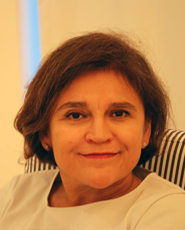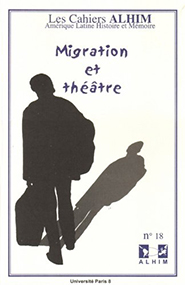Migration and Theatre (Migration et theater – Migración y teatro)
|
Speaker: |
Dr. Nora Parola-Leconte |
|
Moderator: |
Mercedes Vázquez, School of Modern Languages and Cultures, The University of Hong Kong |
|
Date: |
20 November 2014 (Thursday) |
|
Time: |
6:30 - 8:00 pm |
|
Venue: |
Special Collections, 1/F, Main Library, The University of Hong Kong |
|
Language: |
English |
About the Speaker
|
|
Dr. Nora Parola-Leconte is an Associate Professor of Latin American Literature and History at the UPEC – University of Paris, Est, Créteil, France. Dr. Parola-Leconte is also an active researcher in two research groups, ALHIM -Amérique Latine Histoire et Mémoire (Latin American History and Memory) and IMAGER - Institut des mondes anglophone, germanique et roman (Institute for the German, English, Spanish and Italian speaking worlds). Dr. Parola-Leconte is an expert in Latin American Theatre, mainly from Argentina. Her research focuses not only on theater’s literary aspects but on the influence of the political, social and economical spectra on its creation and performance. The influence of immigration in Argentine Theatre, subject of a future lecture at the University of Hong Kong, has been one of her major research themes. Among her many published articles, we find in-depth studies of the relationship between the Theatre of the Absurd and Grotesque and the Argentine Dictatorship of the 70 and the 80; Immigration and Argentine Theatre from the late nineteenth hundreds to the present day and its relationship to the social, political and economical world; how theater reveals the question of Identity and, the Women’s role as writers and their representation in the literary world and society in general. |
About the Book
|
|
The book Migration et Théâtre reveals the great influence of immigration across the social, political and literary spectra in Argentine Theatre. One of the social foundations of this South American country is the concept of the “melting pot”. Massive immigration from eastern and southern Europe doubled the population between 1880 and 1920, therefore changing forever the cultural identity of the country. The imported theatrical genres -mainly sainete- became favorites of the public. Its main characters represented the different nationalities of this melting pot, most of the time shown through caricature. The same characteristics can be seen in the second half of the Twentieth Century when the country witnessed three phenomena: the immigrations from neighboring countries; the immigration of Asians, mainly Chinese; and the minor migration of the first immigrants’ descendants back to Europe, carrying in their luggage new forms of theatre techniques that enriched the Old Continent. The articles are written in Spanish and French, the abstracts are in English. |



